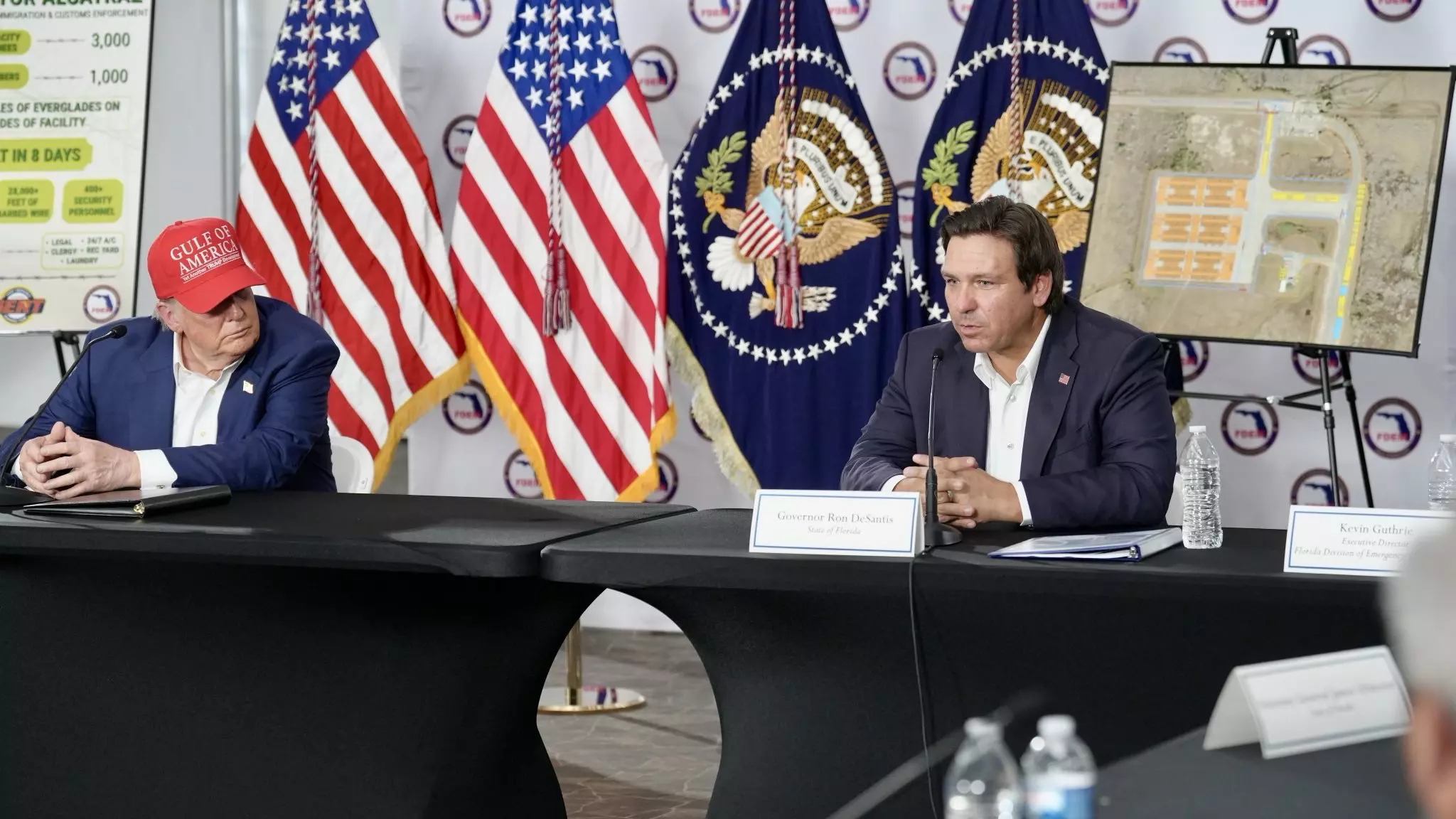
Florida Governor Ron DeSantis has pledged to defy a federal court ruling that orders the dismantling of a controversial migrant detention center known as “Alligator Alcatraz.”
The clash between the Republican governor and U.S. District Judge Kathleen Williams, an appointee of former President Barack Obama, has ignited a new round of political and legal tensions over immigration enforcement, states’ rights, and environmental protection.
At issue is whether the state of Florida can continue operating the facility, which DeSantis has portrayed as central to his administration’s efforts to detain and deport undocumented migrants, or whether the court’s ruling will prevail, forcing the shutdown of a site that has become both symbolic and operationally significant in the broader national immigration debate.
In an 82-page order issued last week, Judge Williams prohibited Florida from admitting new detainees to the Ochopee-based facility and mandated that it be dismantled within 60 days.
Her decision cited the National Environmental Policy Act, as well as claims from the Miccosukee Tribe and several advocacy groups who argued that the facility’s construction posed an immediate and lasting threat to endangered species, particularly the Florida panther.
Williams wrote in her opinion that the detention site’s construction and operation “creates irreparable harm in the form of habitat loss and increased mortality to endangered species in the area.” She directed state officials to remove all associated infrastructure — including industrial lighting, fencing, sewage facilities, generators, and other utilities — within nine weeks.
The ruling effectively brought operations at the facility, nicknamed “Alligator Alcatraz” by critics and supporters alike, to a standstill, leaving the future of its 400 detainees uncertain pending appeals.
Governor DeSantis wasted little time in denouncing the order, calling Williams an “activist judge” who is attempting to impose policy preferences from the bench.
“This was not something that was unexpected. This is a judge that was not going to give us a fair shake. This was preordained,” DeSantis said during a press conference in Tallahassee.

“Very much an activist judge that is trying to do policy from the bench. This is not going to deter us. We are going to continue working on the deportations, advancing that mission.”
The governor underscored that his administration had anticipated the possibility of a judicial setback and had already formulated a contingency plan to expand detention capacity elsewhere in the state.
Tricia McLaughlin, Assistant Secretary at the Department of Homeland Security, blasted the ruling as a politically motivated attempt to obstruct immigration enforcement.
“This ruling from an activist judge ignores the fact that this land has already been developed for a decade,” McLaughlin said in a statement. “It is another attempt to prevent the President from fulfilling the American people’s mandate to remove the worst of the worst including gang members, murderers, pedophiles, terrorists, and rapists from our country.”
Her comments linked the Florida dispute to national politics, emphasizing that the detention facility has served as a hub for deportations across the southern United States.
Florida Attorney General James Uthmeier also weighed in, calling Williams’ decision “a desperate attempt to derail enforcement.” He stressed that, despite the ruling, the facility remains operational for now.
“Alligator Alcatraz remains operational, and we will not stop in our mission to detain, deport, and deliver for the American people,” Uthmeier said.
The state’s legal team has already signaled that it intends to appeal the ruling, setting the stage for a protracted court battle that could reach higher federal courts.
Even as the state braces for legal challenges, DeSantis announced plans to expand Florida’s detention capacity by building a new site in Baker County, north of Jacksonville.
“Because of the success of Alligator Alcatraz, there’s demand for more,” DeSantis said. “So I did announce that we’re going to be opening another facility right outside of Jacksonville in Baker County. We’ve called that the ‘Deportation Depot.’ That is something that will be able to hold another 2,000 and there’s an airport close by. So you have the processing and the removal.”
The governor’s announcement drew immediate criticism from environmental activists, who warned that any new large-scale detention project could carry ecological consequences.
DeSantis, however, insisted that the Jacksonville-area site was chosen precisely because it had already been in use for decades as an airport and would not pose the same environmental risks cited in Judge Williams’ ruling.
Judge Williams’ order relied heavily on the argument that the detention facility contributes to degradation of sensitive Everglades ecosystems. She specifically referenced risks to endangered species such as the Florida panther, which has seen declining habitat ranges as development encroaches on South Florida wilderness.
“Every Florida governor, every Florida senator, and countless political figures have pledged support for the Everglades,” Williams wrote in her ruling, implying that DeSantis’ approach conflicts with longstanding bipartisan commitments to protecting Florida’s fragile environment.
Environmental groups praised Williams’ decision as a win for conservation and tribal sovereignty. Leaders from the Miccosukee Tribe, whose lands are adjacent to the detention site, argued that the construction had been rushed through without proper environmental review.
The legal fight comes against the backdrop of a broader national struggle over immigration enforcement. Former President Donald Trump, during his time in office, clashed repeatedly with federal judges over immigration orders.
Now, with Trump once again seeking the presidency, his allies at the state level — including DeSantis — are doubling down on aggressive enforcement measures.
DeSantis made clear that he views the confrontation with Williams as part of a larger battle to ensure that federal immigration laws are applied without exception.
“We’re now in this position where we’re leading the state effort to help the Trump administration actually enforce the law and actually remove these illegal aliens not just from Florida, but from our country,” DeSantis said.
“That’s something that we didn’t have for four years and now that’s something that we’re absolutely on board with making sure happens going forward.”
His framing of the issue as part of a cooperative effort with Trump reflects his ongoing alignment with the former president on immigration, despite past rivalries during the 2024 Republican primaries.
Republican lawmakers in Florida have rallied around DeSantis, echoing his criticisms of the judiciary. State legislators praised the governor for taking a “no compromise” stance on deportations, arguing that Floridians overwhelmingly support strong immigration enforcement.
Democrats, however, accused DeSantis of endangering the environment and exploiting immigration for political gain. They argue that the governor’s plans to expand detention sites show disregard for Florida’s ecological resources and tribal communities.
Nationally, the debate has polarized commentators. Conservative outlets have applauded Patel’s FBI and DeSantis’ defiance of the ruling as examples of leaders taking decisive action against what they call judicial overreach.

Progressive voices, meanwhile, have described the developments as evidence of creeping authoritarianism and disregard for rule of law.
At present, approximately 400 detainees remain housed at Alligator Alcatraz. Judge Williams’ order leaves their fate uncertain, with possible options including transfer to other facilities, release, or deportation.
Florida officials have signaled that they will not comply voluntarily with the order, at least until appeals are exhausted. This sets up the possibility of a dramatic confrontation between state and federal authorities if enforcement actions are attempted.
For DeSantis, the stakes are not only legal but political. His leadership on immigration has become a hallmark of his governorship, and a defeat in court could undermine his reputation as a leader unafraid to challenge federal institutions.
Conversely, standing firm against the judge could bolster his standing among conservative voters nationally, particularly those aligned with Trump.
The battle over Alligator Alcatraz encapsulates many of the core political conflicts defining the United States today: immigration enforcement, environmental protection, judicial authority, and the role of states in challenging federal decisions.
Governor Ron DeSantis has made clear that he intends to resist Judge Kathleen Williams’ order, framing the confrontation as a fight against judicial activism and in favor of strong deportation policies.
With Florida Attorney General James Uthmeier pledging legal resistance, DHS Assistant Secretary Tricia McLaughlin condemning the court’s decision as obstructionist, and a new detention facility already announced for Baker County, the DeSantis administration is signaling that it will not retreat.

Whether the appeals process ultimately affirms or overturns Williams’ ruling remains uncertain. What is clear is that the future of “Alligator Alcatraz” has become a flashpoint in the national debate over immigration — one that will test not only the resolve of Florida’s leadership but also the boundaries of federal judicial power.
For now, the 400 detainees housed at the site remain in limbo, as the state of Florida and the federal judiciary head toward a high-stakes legal showdown. As DeSantis declared: “We’re not going to be deterred. We are totally in the right on this.”





